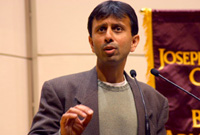U.S. Rep. Bobby Jindal has proposed a plan that would rely on education, business and housing to have the displaced residents and economy return and partake in the city’s future. Jindal, R-Kenner, detailed his plan at Roussel Performance Hall last Thursday.
“The politically easy answer would be to rebuild New Orleans exactly as it was,” he said. “To rebuild New Orleans exactly as it was is to ignore serious, serious problems.”
Instead, he said he wants to “get it right.”
“I want to make sure that we don’t replicate the bureaucracy that caused all those problems [during the storm’s immediate aftermath] as we rebuild New Orleans,” Jindal said.
Jindal talked about a three-step process plan based on the immediate reactions of Mississippi Gov. Haley Barber in his petitioning for federal aid from Congress.
What impressed Washington about Mississippi’s disaster response, Jindal said, is that soon after the storm, recovery plans were cemented. By bringing in national planners and having local town meetings quickly, Washington funneled federal funds willingly to their recovery.
That Mississippi was so precise in detailing the money they needed as well and what it would be used to accomplish has disarmed skeptics of Mississippi, the same skeptics who are timid about giving money to politicians of historically corrupt Louisiana, Jindal said. He added that by enacting a system to track federal appropriations, Capitol Hill will be more open to funneling money into the reconstruction of New Orleans.
“Skeptics are just looking for one $500 hammer to have the excuse to stop helping New Orleans,” Jindal said.
Mississippi has also professed a willingness to invest in its share of rebuilding, a step Louisiana has been lagging in.
Jindal said that the issue of category 5 levee protection must be solved. He mentioned that Louisiana produces $5 billion a year in off-shore revenue for the federal government.
“Give us some of it, some of what is ours,” he said. “We’ll have more than enough to rebuild our coast, our levees.”
Jindal hopes the federal government aids New Orleans’ economic development – and quickly. Jindal said the city needs more than just tax breaks in terms of business incentives to make it attractive for both local businesses and actual corporations to return to the area.
His last measure dealing with the federal government involves the way they compensate New Orleans’ homeowners. With insurance companies not paying for everything and families getting slammed with devastating losses, Jindal said that spending money on homeowner’s compensation would encourage the country to keep helping.
Jindal said that the $6 billion already granted needs to be spent refurbishing houses and compensating families hurt economically by the storm.
“It is not only a social, but a moral obligation,” he said.
Measures made at the state government, however, are what Jindal is banking on to re-invent a New Orleans that was sorely lacking in three departments: healthcare, education and public housing.
Jindal sees a prime opportunity to dispense affordable healthcare to a wider net of citizens then ever before. Jindal reported that Capitol Hill is voting on a bill that would appropriate $1 billion to returning the Veterans Administration, Tulane and LSU hospitals’ operations to the city. With leftover money, he wants to construct clinics for people of lesser means to have routine check-ups without having to go to the emergency room.
Jindal hopes to restructure the school system, with an educated workforce living and working in the city’s future. Any money awarded to the area, he urged, should be invested aggressively into refurbishing a languishing school system by way of better teacher’s programs, better educational offerings to keep kids in the state’s universities and to urge university students to participate in a future workforce that will move the state forward.
As for public housing, Jindal labeled pre-Katrina housing projects as “virtual prisons.” Even in the 1960s, they were inadequate, and little had been done to improve them, he said.
There was not enough diversity of families, there was a pernicious criminal element (full-fledged underworlds of drugs, murder and sex crimes), and there was little opportunity for upward movement for the inhabitants of these housing projects.
“Shame on us if we rebuild them the same,” Jindal said.
Jindal began his speech with a series of comic anecdotes about a displaced woman winning a refrigerator on the Tony Danza show in New York as well as a score of FEMA horror stories.
The comic stories, he said, “Give me more hope about the state’s future than anything else.”
Ramon Vargas can be reached at ravarga1@loyno.edu.






